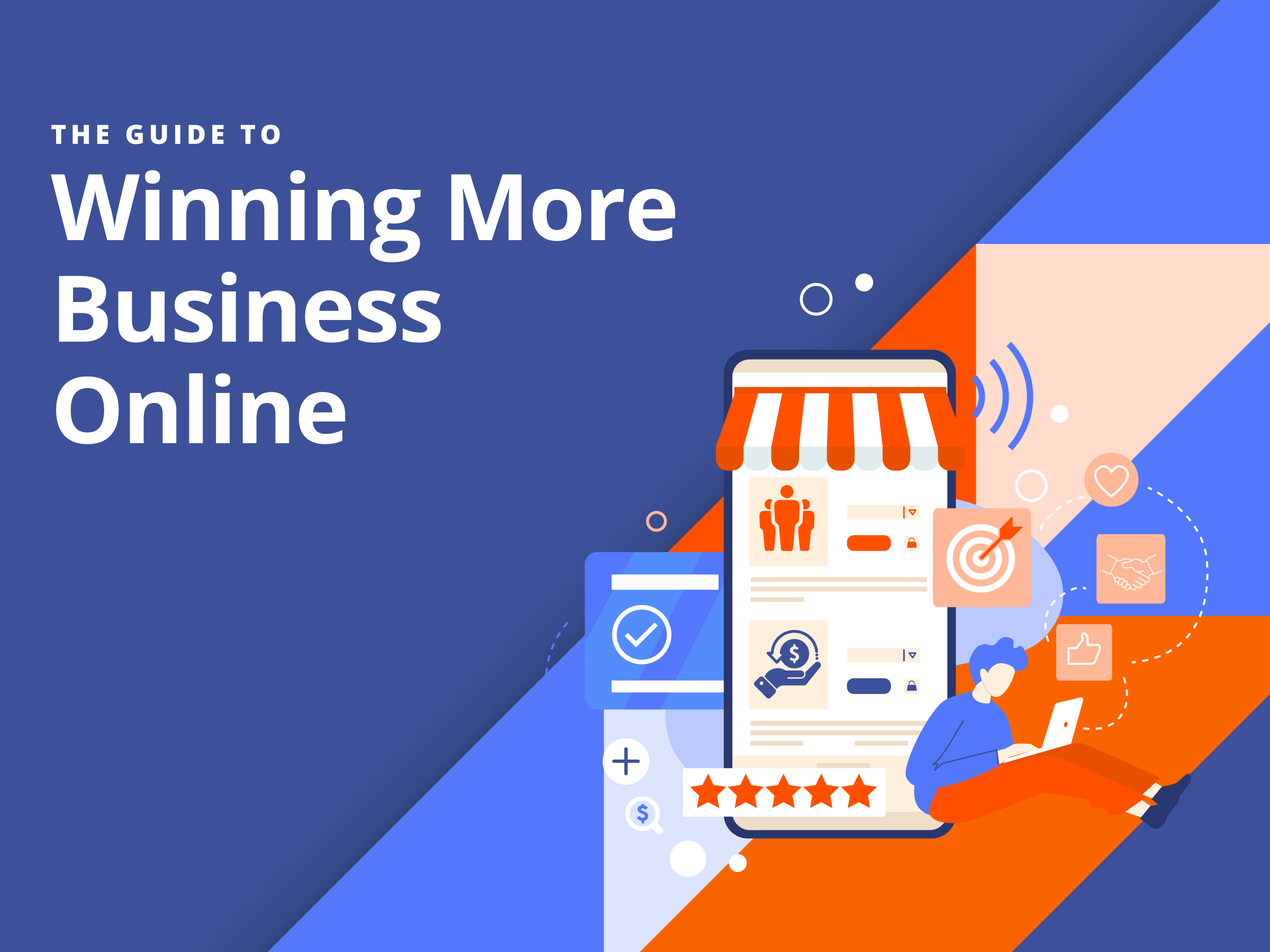Every business, big or small, needs to manage its online reputation.
There are dozens of sites where customers can leave reviews (I would know; I wrote about 50 of them here), and their feedback plays a major role in how people perceive your brand. Good reviews lead to customer referrals and repeat purchases, while bad ones make customers less interested in your company.

Free: The Guide to Winning More Business Online
Save NowIn this post, we’ll discuss everything you need to know about online reputation management. We’ll dive into why managing online reviews is important and what you can do to monitor your business’s reputation.
What is Online Reputation Management?
Online reputation management (ORM) is how you monitor, review, and reply to online reviews. It involves tracking different review sites, engaging with customer comments, and asking people to write positive reviews about your business.
Online reputation management starts with review tracking. Your business needs a system to monitor comments from channels like:
- Social Media
- Search Engines
- Customer Review Sites
- Online Stores
- Your Website
You also need a strategy for responding to customer reviews. Most customers expect you to reply to their comments, whether good or bad. It nurtures the customer relationship and creates a better shopping experience.
The last piece is feedback collection. Small businesses should have a way to ask for customer reviews. It helps you acquire more customers and grows your online presence.
In the next section, let’s look at a few more reasons why your online reputation is important.
Why is Your Online Reputation Important?
Here are seven reasons why it’s important to manage your online reputation.
1. Customers read online reviews.
75% of people regularly read online reviews before making a purchase, and only a small percentage don’t read reviews at all. That means customers actively seek out reviews before doing business with your company, and reviews play an important role in how people perceive your brand.
Online reviews are everywhere, from Google, Yelp, and Craigslist to social media sites like LinkedIn, Instagram, and TikTok. Whether it’s a comment on your latest post or a five-star rating on Yelp, there are plenty of places where customers can read reviews about your business, which impacts purchases, referrals, and more.
2. Good reputations lead to more business.
Along with sharing reviews, customers buy what they see on social media. 71% of social media users have bought something they’ve seen on a live stream, and most consumers will buy at least one product from social media this year. If your business has a bad online reputation, fewer people will be interested in buying something from your brand.
3. Small businesses rely on their online reputation.
Big brands receive tons of online reviews. For instance, here’s a Walmart with over 5K Google Reviews.
One bad review won’t hurt Walmart that much, but it could damage the reputation of a business with only 50 reviews.
Small businesses rely more on their online reputations because they have more to gain (and lose) from each customer. The stakes are higher because they receive fewer reviews, so each comment affects their overall rating more.
That’s also why small brands need to ask for customer reviews. You don’t always have the luxury of customers actively voicing positive feedback. Email automation is a great resource for generating consistent reviews that improve your online reputation.
4. Customers expect engagement.
Even if your business receives glowing reviews and has a spotless reputation, that doesn’t mean you can ignore your online presence. Customers expect you to respond, and 88% prefer to do business with brands that reply to all of their online reviews.
Customer engagement can also help you improve your online reputation. If you receive a poor review, you can ask the customer for more information and rectify the bad experience. Even if the customer doesn’t change their review, others will appreciate that you tried to resolve a customer complaint.
5. It’s easier to find you online.
Customers aren’t the only ones who like good reviews – search engines use them, too. Sites like Google and Yelp use reviews as a ranking factor, which means the more good reviews you have, the more likely you are to appear in search results.
Here’s an example – let’s search for “best chiropractor near me.” Notice how the top results all have good reviews.
If you want your business to appear in search results like these, you need to collect good reviews and build your online reputation.
6. You can build brand awareness through content marketing.
Another reason for having a good reputation is content marketing. Using your good reviews, you can create customer testimonials and similar content to encourage people to do business with your brand.
Third-party websites may also feature your company in blog posts like this one. Notice how this post appears with the same search phrase that we used in the last example:
People considering a purchase may use these pages to learn more about your business. So, it’s important to keep your local listings updated with your operating hours, location, contact information, and more.
7. Your reputation influences brand loyalty.
On a simpler level – a good online reputation leads to customer loyalty. The Internet has become part of the customer experience, and people expect the same level of care and personalization online as you give them in person. If your digital experience falls short, it negatively influences in-person interactions.
However, if your online reputation is good and you effectively manage communication, it will lead to better customer experiences. People will want to make repeat purchases with your brand because it’s easy to do business with you – online and off.
Let’s look at an example where online reputation management can make a difference for your brand.
Online Reputation Management Example
For this example, let’s say we run an auto repair shop without an online presence. We don’t have a website or social media accounts, and we haven’t created a Google Business Profile. It’s impossible to leave a review for our business, right?
Wrong. Sites like Google and Yelp can create local listings for you. They create profiles that need to be “claimed,” and customers can leave reviews for them, which means even our fictional auto repair shop needs to be mindful of our online reputation. Customers could still post about our business even though we don’t have active accounts on these sites.
That’s why it’s better to create a business profile and claim your listings on sites like Google and Yelp. You’ll be notified when people leave a review and can respond quickly.
Here’s where an online reputation manager will benefit your business. It connects your digital channels so you can manage customer reviews from one place.
What is an Online Reputation Manager?
Your online reputation is an asset, just like your business’s equipment. It should be protected the same way you’d protect your merchandise. But that’s easier said than done, especially when you have multiple communication channels to keep track of.
Customers also use multiple review sites before choosing a business to buy from. Most customers check at least two sites before making a purchase, making it even more important to stay on top of your review channels.
Online reputation management tools make it easy to monitor what people say about your business and where they say it. They scan the internet for mentions of your brand and check reviews for accuracy so you can respond if needed. Rather than switching between apps, you communicate through one system, so comments are never missed, and you get an overall view of your online reputation.
These tools are also convenient for updating your information over time. Say your business moves or gets a new phone number; you can update all your online listings from one place. You don’t have to do it one by one, saving time that could be used to focus on other tasks.
Bonus: Here’s a list of the best online reputation management services for small businesses.
Managing Your Online Reputation
No matter the size of your business, customers are talking about you somewhere. Ignorance is no longer bliss, and what you don’t know about your reputation can hurt you. Building a good business reputation takes a lot of time, but it only takes a few inaccurate or damaging comments to bring it down.
Start managing your online reputation and see what customers say about your business. You could learn a lot about improving your company’s products or services and gain a lifetime of customers that you might otherwise have lost.

The Guide to Winning
More Business Online
Want customers to find you online? A website is not enough.







